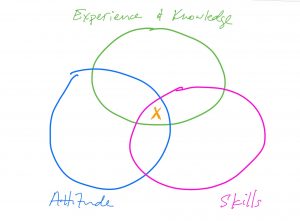Recruitment of Existing Employees
Sure, most organizations think carefully about their approach to recruiting and hiring employees. How many organizations consider how they will recruit employees as communication ambassadors during times of organizational change? As we enter a period of wide-ranging changes in various workplaces and industries, the ability to “recruit” employee ambassadors to help implement changes will become even more important (read this previous blog post about some of these likely workplace changes and their implications).
Officially, the CEO and other decision-makers drive change. In practice, however, who is really the influencer in how this change plays out? Whether they are appointed or informal, certain employees are your real ambassadors of change. They are the eyes, ears, and heart of your organization. They are the respected peers, leaders, and confidants who understand how people really think and act.
When chosen properly, these ambassadors can help decision-makers act on what is really happening, not just what the decision-makers think is happening.
The Link between Employee Engagement and Organizational Change
Employee engagement in a business is often very low. According to Gallup, only about 30% – 35% of employees are engaged. This means that there’s usually a weak connection between the official leadership and the employees who will be impacted by an organizational change. Consequently, it’s important to find influential employees and engage them as your change ambassadors. These ambassadors will help explain the organization’s story in ways that will resonate with most employees.
Content Marketing as a Metaphor for Organizational Change
Content marketing has grown in influence because consumers distrust traditional advertising. Plus, as media consumption has evolved away from broadcast TV and live radio, fewer people are exposed to traditional advertising. One implication of this shift is that consumers prefer to learn about companies and service providers based on the information that they provide or through their trusted networks. Similarly, disengaged employees probably don’t place much stock in official corporate communications … but they are more likely to believe what they learn informally through their trusted peers.
What is the profile of an ideal ambassador?
Ideally, your hiring process has gained you some appropriate employees to choose from when selecting change ambassadors. Here are some criteria to keep in mind:
Skills:
- Effective communication and interpersonal skills so that they can explain the path forward in a credible and compelling way.
- Leadership ability – regardless of job title.
- Problem-solving ability, often in real time. Ambassadors need to be able to think on their feet and deal with issues immediately.
Attitude:
- They should be trustworthy peers and confidantes, it’s worth making great efforts to support ambassadors’ well-intentioned efforts and avoid asking them to do or say things that compromise others’ trust in them.
Experience and Knowledge:
- To have credibility, your ambassadors need to have credible experience in and awareness of the organization.
- Ideally, you should include individual contributors and leaders/executives.
Facing an HR or Career-Related challenge? I invite you to contact me privately. I offer a free 15 to 20-minute initial consultation by phone. Or, if you prefer, you can contact me via by email, or via direct message on Twitter, Facebook, or LinkedIn.
More than career coaching, it’s career psychology®.
I/O Advisory Services – Building Resilient Careers and Organizations.
Note – This blog article was originally published on the Thornley Fallis website. Thornley Fallis is an integrated marketing communications agency in Ottawa and Toronto. They combine insight, creativity, and connection in solving clients’ challenges and meeting their business and organizational objectives.
Easily share this article using any of the social media icons below.




